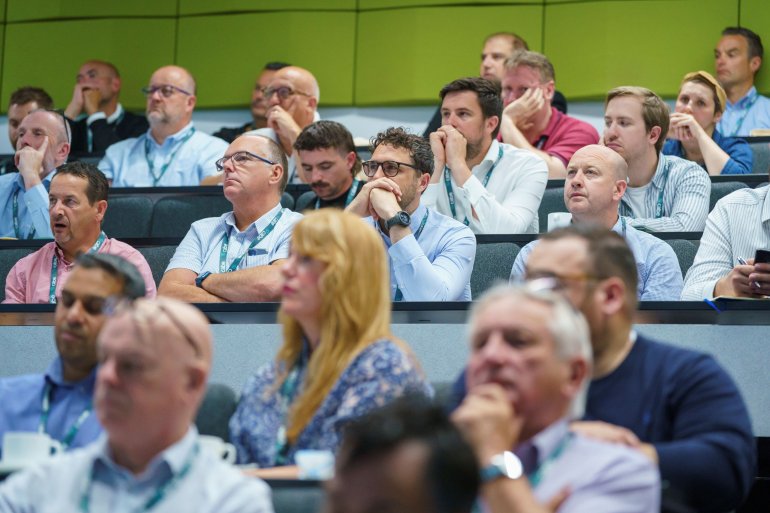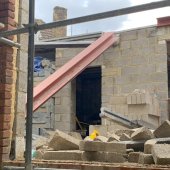Built Environment series lands in Wales

Last Wednesday (22 June) saw the continuation of CABE’s Built Environment series, with the CABE team, members and experts alike gathering at Cardiff Metropolitan University for Built Environment Wales.
Welcoming delegates to the second event of the series, Richard Smith, Head of Standards, Innovation & Research National House Building Council (NHBC) gave his President’s address, followed by session one which provided delegates with an update on the Building Regulations & Building Safety Programme in Wales, presented by CABE Technical Director, Richard Harral, and Head of Building Regulations Policy for the Welsh Government, Francois Samuel.
Richard and Francois explored in more detail the latest developments of the Building Regulations in Wales and how the Building Safety Programme is likely to be implemented.
"Local authorities will be the governing bodies for high-rise buildings in Wales,” Francois told delegates. There will be no Building Safety Regulator (BSR) in Wales.”
Speaking about the principles for Building Control Inspectors, Richard reminded the audience that they must act with honesty, integrity, and maintain professional competence.”
The next session was given over to a panel of experts in their field: Hanna Clarke, Digital and Policy Manager at the Construction Products Association (CPA); Hardy Giesler, Chief Executive Officer, British Board of Agrément (BBA); and CABE’s Chief Executive Dr Gavin Dunn, who discussed the implications to the testing, certification and specification of construction products.
"Local authorities will be the governing bodies for high-rise buildings in Wales. There will be no Building Safety Regulator (BSR) in Wales."
— Chartered ABE (@cbuilde) June 22, 2023
- Francois Samuel, Head of Building Control Regulations @WelshGovernment#builtenvseries pic.twitter.com/g3kzJlGCjV
"We have to build; we have to specify products,” said Gavin. “We have to be confident that these products are safe and compliant. This is where certification, regulation and testing come in.”
Hanna agreed: "Product liability will apply to suppliers of construction products to be held accountable where the product used in works causes or contributes to a dwelling being unfit for habitation."
Moving on to the third session of the day, CABE President Richard Smith was joined by Chief Executive of the New Homes Quality Board, Leon Livermore, and Chartered Building Engineer Peter Cole. First to the stage was Richard, to discuss the role of NHBC and the journey to reduce the number of claims being made on new homes. "Pitched roofs consistently cause the greatest number of claims,” he warned.
"The new homes quality code builds on existing consumer codes and fills in the gaps in current arrangements. The principles are based on treating customers fairly, honestly and admitting when something's gone wrong," added Leon.
Noting that buying a new home should be an exciting purchase, Pete agreed that disputes with builders causes anxiety and stress. “Professional snagging surveys are a non-intrusive survey of a new build dwelling, offering customers better protection,” he told delegates.
The final session of the day is Achieving Low or Zero Carbon in Practice.
— Chartered ABE (@cbuilde) June 22, 2023
We will hear from John Littlewood @cardiffmet, Stuart Fairlie, Managing @ElmhurstEnergy, Dr Jo Atkinson @EnergySysCat, Stuart Jones @WatesGroup and David Jacques @cardiffcouncil.#builtenvseries pic.twitter.com/2QQw0qv4s1
The final session of the day was chaired by Professor John Littlewood, Professor of Sustainable and Resilient Buildings at Cardiff Metropolitan University, who was joined by a selection of expert speakers. This panel explored the practicalities of delivering low and zero carbon buildings in our sector and the challenges of delivering the future requirements home for both new and existing buildings.
John spoke about a ‘knowledge transfer partnership’ between with Cardiff Metropolitan University and Seven Oaks Modular, which is looking at modern methods of construction to innovate, selecting wood fibre insulation as a sustainable option.
“New build standards for domestic homes demand a reduction in carbon emissions,” panellist Stuart Fairlie, Managing Director at Elmhurst Energy, reminded the audience. “We need new innovations and cultural change to achieve this. The tougher standards will change how homes are built.”
Energy Systems Catapult’s Practise Manager of Buildings, Dr Jo Atkinson, spoke about an active building approach to net zero carbon. “A building generates more electricity than it consumes,” she noted. “Active homes cost slightly more, but because there are no electricity bills over the life of the building, they cost less.”
Stuart Jones, Regional Development Director at Wates Residential, suggested that when building homes and working with existing constraints, it can be difficult to deliver on some of the intended outcomes and initiatives. “But these are things that we need to consider and learn from going forward," he said.
The housing crisis was also inevitably discussed. "There’s never been as much housing crisis as there is now,” said David Jacques, Cardiff Council’s Operational Manager for Development and Regeneration. “The demand across Wales has grown. What we need to focus on is how we close the gap between standards used in social housing compared to those used on houses for sale.”
To join us for Built Environment LIVE in London this December, register your interest here.







